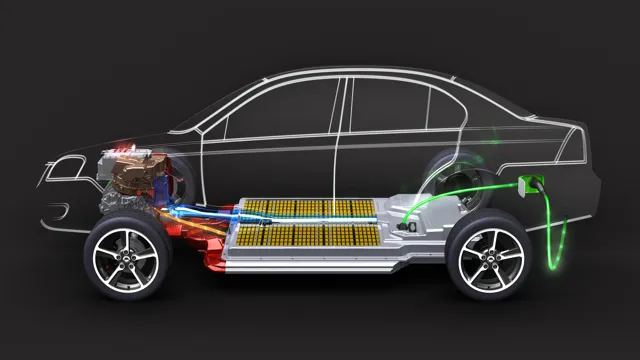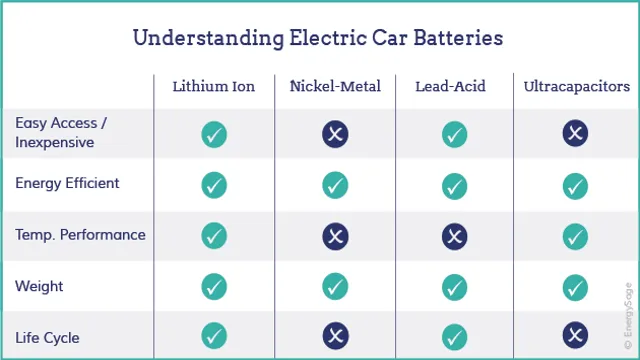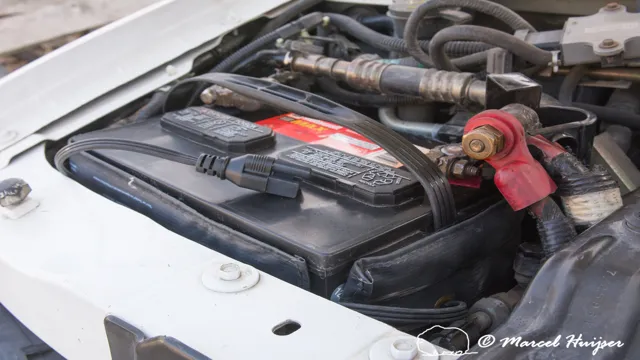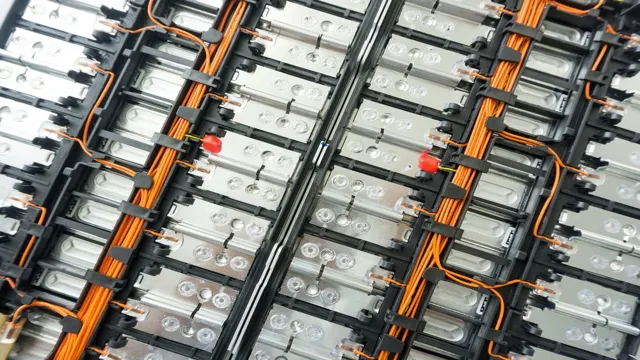Uncovering the Truth Behind Electric Car Batteries’ Carbon Footprint: How Sustainable Are They Really?
Electric cars are becoming increasingly popular among eco-conscious consumers due to their sustainability and reduced environmental impact compared to traditional gasoline vehicles. However, many people are concerned about the carbon footprint of electric car batteries. Are they really as environmentally friendly as advertised? In this blog, we’ll explore the carbon footprint of electric car batteries and address some misconceptions around their sustainability.
While electric cars may emit fewer greenhouse gases on the road, the manufacturing process for their batteries can still have a significant impact on the environment. We’ll also explore how the materials used in electric car batteries, such as lithium and cobalt, are sourced and processed and the environmental impact of these processes. It’s important to note that while there are challenges with the production of electric car batteries, there are also innovative solutions being developed to mitigate their impact.
So, are electric car batteries truly environmentally friendly? It’s a complex issue, but by the end of this blog, you’ll have a better understanding of the carbon footprint of electric car batteries and what it means for the future of sustainable transportation.
What is a Carbon Footprint?
Electric car batteries carbon footprint refers to the amount of greenhouse gases emitted during the production, use, and disposal of electric vehicle batteries. While electric cars produce zero carbon emissions on the road, the manufacturing process of the battery packs requires a significant amount of energy, which is predominantly derived from fossil fuels. Consequently, the production of electric car batteries generates a larger carbon footprint than conventional vehicle engines.
However, this is offset by the clean energy generated through the use of electric cars throughout their lifespan. Furthermore, the overall carbon footprint of electric vehicle batteries can be reduced with the development of more efficient manufacturing processes and the shift towards renewable energy sources. As such, the carbon footprint of electric car batteries is an important factor to consider in the transition to cleaner, electrified transportation.
Explaining the Concept
A carbon footprint refers to the amount of greenhouse gases, including carbon dioxide, produced by an individual, organization, or product. It is a measure of human impact on the environment, particularly climate change. Every time we drive our cars, heat our homes, or consume goods and services, we are increasing our carbon footprint.
The larger our footprint, the greater our contribution to global warming and the destruction of the planet. Understanding our carbon footprint is important because it allows us to take steps to reduce our impact on the environment. By making small changes to our behavior, such as turning off lights when we leave a room or walking instead of driving, we can all contribute to a healthier and more sustainable planet.
Electric Car Batteries and Their Impact on the Environment
When it comes to electric vehicles, one of the biggest concerns is their impact on the environment. While electric cars don’t emit any harmful pollutants while they’re on the road, the production of their batteries can have a significant carbon footprint. The manufacturing process for electric car batteries involves mining and processing materials such as lithium and cobalt, which can release large amounts of carbon dioxide into the air.
However, it’s important to note that the carbon footprint of electric car batteries is relatively small compared to the emissions saved over the car’s lifetime. Additionally, efforts are being made to reduce the carbon footprint of battery production by using renewable energy sources and designing more efficient battery production systems. As the popularity of electric vehicles continues to grow, it’s important to recognize both the benefits and potential environmental impacts of their batteries.
Manufacturing Process
Electric car batteries have a significant impact on the environment, both during their manufacturing process and throughout their lifespan. The production of lithium-ion batteries, which are commonly used in electric cars, involves a complex and energy-intensive process that produces a sizable carbon footprint. The extraction and mining of raw materials, such as lithium and cobalt, also have negative environmental impacts, including the release of harmful chemicals and land degradation.
However, efforts are being made to reduce the carbon footprint of battery production by using renewable energy sources and recycling materials from old batteries. It is essential to consider the entire life cycle of electric car batteries to fully understand their environmental impact. While they may produce fewer emissions than traditional cars during their use, the manufacturing and disposal of these batteries must be taken into account to truly assess their sustainability.
Transportation
Electric car batteries are a crucial component of electric vehicles and their impact on the environment is a growing concern. Lithium-ion batteries, which are used in most electric cars, contain various metals like cobalt, nickel, and lithium, which can have harmful effects on the environment if they are not responsibly disposed of. These metals can contaminate soil and water, and can also release toxic chemicals into the air during the manufacturing process.
However, the environmental impact of electric car batteries is still less than that of traditional gasoline cars, as they emit far fewer pollutants into the air. Furthermore, as battery technology advances, alternative materials like solid-state batteries and sodium-ion batteries are being developed that could lead to a more sustainable future for electric cars. By transitioning to electric cars, we can significantly reduce our carbon footprint and lessen the environmental impact of transportation.
Disposal and Recycling
Electric car batteries are becoming increasingly popular as a green alternative to traditional gas-powered vehicles. However, these batteries also have their own impact on the environment, especially when it comes to disposal and recycling. When an electric car battery reaches the end of its useful life, it must be properly disposed of to prevent toxic chemicals and metals from leaching into the soil and water.
Recycling is also an important part of the battery disposal process, as it helps to recover valuable materials and reduce the environmental impact of creating new batteries. While electric car batteries have a significant impact on the environment, proper disposal and recycling can help to mitigate their effect and ensure a more sustainable future.
Comparing the Carbon Footprint of Electric Car Batteries to Traditional Car Batteries
When it comes to the carbon footprint of electric car batteries compared to traditional car batteries, there are some important differences to consider. Electric car batteries are generally considered to have a lower carbon footprint than traditional car batteries, due to their use of cleaner energy sources like wind and solar power. However, it’s also important to consider the entire life cycle of the battery, from production to disposal.
For example, the production of electric car batteries requires a significant amount of energy, as well as the mining of materials like cobalt and lithium, which can have negative environmental impacts. On the other hand, traditional car batteries tend to be more easily recyclable, which can help to mitigate some of their environmental impact. Ultimately, when it comes to comparing the carbon footprints of electric car batteries and traditional car batteries, there are many factors to consider, and the answer will depend on a variety of individual factors, including the specific car and battery in question, as well as the location and type of energy used to power them.
Data and Statistics
When it comes to comparing the carbon footprint of electric car batteries to traditional car batteries, the results may surprise you. While electric car batteries do require a significant amount of energy to produce, the overall carbon emissions during their lifetime are much lower than those of traditional car batteries. This is due in large part to the fact that electric cars emit fewer greenhouse gases, such as carbon dioxide, during use.
Additionally, electric cars are generally more energy-efficient than traditional cars, which means they require less energy to operate and therefore emit fewer emissions. That being said, it’s important to keep in mind that the production of electric car batteries does still have a carbon footprint, and there is still much work to be done in reducing the environmental impact of their production. Overall, it’s clear that electric car batteries have the potential to significantly reduce our reliance on fossil fuels and contribute to a more sustainable future.
Environmental Benefits of Electric Vehicles
When it comes to reducing our carbon footprint, electric vehicles are becoming an increasingly popular choice. However, some people have raised concerns about the environmental impact of the batteries used in electric cars compared to traditional car batteries. Fortunately, recent studies have shown that the carbon footprint of electric car batteries is significantly lower than regular car batteries.
This is because electric car batteries can be recycled and reused more easily, while traditional car batteries often end up in landfills, contributing to pollution and environmental degradation. So, if you’re looking for an eco-friendly vehicle option, consider an electric car and rest assured that you’re making a responsible choice for our planet.
What Can Be Done to Reduce the Carbon Footprint of Electric Car Batteries?
Electric car batteries have been hailed as a game-changer in the fight against climate change, but their production itself has a significant carbon footprint. In order to reduce this impact, manufacturers are exploring different approaches. One of these is the use of recycled materials in battery production, which can significantly reduce emissions associated with mining and processing new materials.
Additionally, more efficient manufacturing processes can be implemented to reduce the overall amount of energy used and emissions released during production. Furthermore, manufacturers can explore the use of renewable energy sources to power their factories and supply chains. Finally, the development of improved end-of-life options for batteries, such as repurposing or recycling, should be a priority to further reduce their footprint.
By implementing these strategies, we can minimize the negative impact of electric car batteries and create a more sustainable future.
Conclusion
In conclusion, the carbon footprint of electric car batteries is like trying to balance a seesaw on a tightrope; complex, nuanced, and often misunderstood. While there are certainly carbon emissions associated with the production and disposal of these batteries, the benefits of driving an electric vehicle far outweigh the environmental costs. It’s like eating a piece of cake – sure, there are some calories and sugar involved, but the enjoyment and satisfaction gained from the experience are worth it.
So, let’s keep driving towards a more sustainable future, one charged battery at a time!
FAQs
What is an electric car battery’s carbon footprint compared to a traditional gasoline car’s carbon emissions?
Electric car batteries have a lower carbon footprint compared to traditional gasoline cars. According to a study by the Union of Concerned Scientists, an electric car’s lifetime carbon emissions can be up to 50% lower than a gasoline car.
How are electric car batteries disposed of, and do they contribute to environmental pollution?
Electric car batteries can be recycled and reused, reducing their impact on the environment. However, if not properly disposed of, they can contribute to pollution. Governments and automakers are working to develop better techniques for battery disposal.
Are there any advancements in electric car battery technology that could further reduce their carbon footprint?
Yes, advancements in battery technology such as solid-state batteries and improved lithium-ion batteries can further reduce the carbon footprint of electric cars. Additionally, using renewable energy sources to power electric cars can further reduce their impact on the environment.
How do electric car batteries compare in terms of cost to traditional gasoline cars?
Electric car batteries are generally more expensive than traditional gasoline cars, but the cost is decreasing as technology advances. However, electric cars have lower operating costs and require less maintenance, which can make them more cost-effective in the long run. Additionally, some governments offer incentives for purchasing electric cars to offset the initial cost.




